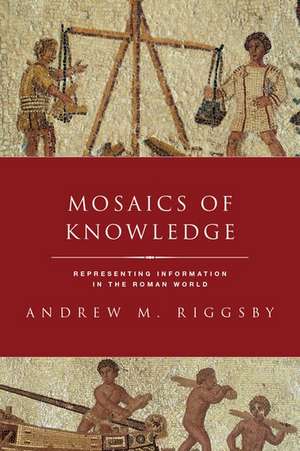Mosaics of Knowledge: Representing Information in the Roman World: Classical Culture and Society
Autor Andrew Riggsbyen Limba Engleză Hardback – 10 oct 2019
Preț: 511.14 lei
Preț vechi: 587.50 lei
-13% Nou
Puncte Express: 767
Preț estimativ în valută:
97.80€ • 102.39$ • 80.93£
97.80€ • 102.39$ • 80.93£
Carte tipărită la comandă
Livrare economică 25-31 martie
Preluare comenzi: 021 569.72.76
Specificații
ISBN-13: 9780190632502
ISBN-10: 019063250X
Pagini: 264
Ilustrații: 37 illustrations
Dimensiuni: 236 x 163 x 23 mm
Greutate: 0.54 kg
Editura: Oxford University Press
Colecția OUP USA
Seria Classical Culture and Society
Locul publicării:New York, United States
ISBN-10: 019063250X
Pagini: 264
Ilustrații: 37 illustrations
Dimensiuni: 236 x 163 x 23 mm
Greutate: 0.54 kg
Editura: Oxford University Press
Colecția OUP USA
Seria Classical Culture and Society
Locul publicării:New York, United States
Recenzii
With Mosaics of Knowledge, Andrew Riggsby has produced a very ambitious and thought-provoking book
Riggsby, professor in classics and of art history at the University of Texas, Austin, conducts a very scholarly guided tour of how the Romans represented information (via concepts such as lists, tables, weights and measures, landscapes, and more) — often for very limited, rather than universal, uses. The best kind of academic work, rendering the commonplace unfamiliar. The landscape examples dazzle.
Throughout this tome [Riggsby] is meticulous in discussing the views of other scholars and in providing evidence for his own theories. It is a work of specialised scholarship, rather than aimed at the general reader.
REVIEW: Jason König, University of St. Andrews, 01/03/2019. Quote loaded: 14/03/2019
REVIEW: Michael Koortbojian, Princeton University, 01/03/2019. Quote loaded: 14/03/2019
REVIEW: Richard J. A. Talbert, University of North Carolina, Chapel Hill, 01/03/2019. Quote loaded: 14/03/2019
With Mosaics of Knowledge, Andrew Riggsby has produced a very ambitious and thought-provoking book. Like Daryn Lehoux's What Did the Romans Know? [2012], Riggsby's new book reminds us that the Romans did not see science or technology as we do...Riggsby explores how the Romans understood and used several types of information technology. Here I summarize and comment on what I consider to be the key contributions of each chapter...More specifically, he focuses on Latin and visual forms of information technology used in the period before AD 300...As Riggsby points out, many forms of information technology are specialiized uses of writing, and therefore linguistically specific. With the possible exception of Roman wall-paintings, every form of technology.
In terms of its subject, scope and theoretical framework this is the first study of its kind, and its central questions are manifestly important... Riggsby's creative exploitation of the evidentiary value of different ways of arranging and encapsulating data- e.g. spatial representations as reflections of imperial logic applied to physical landscapes, or listing methods as indicators of the capacity for mobilizing administrative knowledge-showcases the potential of this approach to generate new insights, even from well-known sources... This is a highly promising and exciting new direction for research on the Roman empire.
Riggsby delineates an innovative and productive approach that will surely enrich the study of Roman documentary practices and mentalités.
Riggsby, professor in classics and of art history at the University of Texas, Austin, conducts a very scholarly guided tour of how the Romans represented information (via concepts such as lists, tables, weights and measures, landscapes, and more) — often for very limited, rather than universal, uses. The best kind of academic work, rendering the commonplace unfamiliar. The landscape examples dazzle.
Throughout this tome [Riggsby] is meticulous in discussing the views of other scholars and in providing evidence for his own theories. It is a work of specialised scholarship, rather than aimed at the general reader.
REVIEW: Jason König, University of St. Andrews, 01/03/2019. Quote loaded: 14/03/2019
REVIEW: Michael Koortbojian, Princeton University, 01/03/2019. Quote loaded: 14/03/2019
REVIEW: Richard J. A. Talbert, University of North Carolina, Chapel Hill, 01/03/2019. Quote loaded: 14/03/2019
With Mosaics of Knowledge, Andrew Riggsby has produced a very ambitious and thought-provoking book. Like Daryn Lehoux's What Did the Romans Know? [2012], Riggsby's new book reminds us that the Romans did not see science or technology as we do...Riggsby explores how the Romans understood and used several types of information technology. Here I summarize and comment on what I consider to be the key contributions of each chapter...More specifically, he focuses on Latin and visual forms of information technology used in the period before AD 300...As Riggsby points out, many forms of information technology are specialiized uses of writing, and therefore linguistically specific. With the possible exception of Roman wall-paintings, every form of technology.
In terms of its subject, scope and theoretical framework this is the first study of its kind, and its central questions are manifestly important... Riggsby's creative exploitation of the evidentiary value of different ways of arranging and encapsulating data- e.g. spatial representations as reflections of imperial logic applied to physical landscapes, or listing methods as indicators of the capacity for mobilizing administrative knowledge-showcases the potential of this approach to generate new insights, even from well-known sources... This is a highly promising and exciting new direction for research on the Roman empire.
Riggsby delineates an innovative and productive approach that will surely enrich the study of Roman documentary practices and mentalités.
Notă biografică
Andrew M. Riggsby is a historian of the Roman world. Educated at Harvard and Berkeley, he is now Lucy Shoe Meritt Professor in Classics at the University of Texas at Austin. He is a Fellow of the American Academy in Rome and was the Stanley Kelley Jr. Visiting Professor for Distinguished Teaching in Classics at Princeton University.










